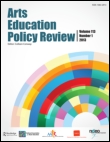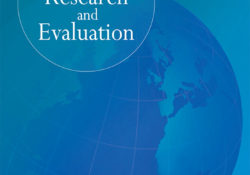tandfonline.com har udgivet en rapport under søgningen “Teacher Education Mathematics”: ABSTRACT ABSTRACT As a result of international neoliberal and neoconservative trends, the status of the arts has been devalued in secondary school curricula. This paper examines why the arts are not considered core educational knowledge in pedagogic discourse arising from the New Right policy agenda. In a case study analysis of Swedish educational policy debates, curriculum codes and their underlying principles of recontextualization are weighed as they bear on the arts. Discursive positionings and socio-political networking between political standpoints and stakeholders have been analysed based on official Swedish documents associated with the legislative process of curriculum revision. Our findings show how justifications of arts education clash with coding orientations arising from a strong classification between what is presumed to be… Continue Reading →
Like this:
Like Loading...
tandfonline.com har udgivet en rapport under søgningen “Teacher Education Mathematics”: ABSTRACT ABSTRACT In Finland, curriculum design is allegedly carried out through a deliberative process that involves various stakeholders, interest groups, experts and ordinary citizens. To facilitate participation in curriculum design, online crowdsourcing has been applied. The objective of this study is to explore to what extent the design process of the latest Finnish national curriculum for mathematics was open, democratic and deliberative. The theoretical framework of the study is the theory of democratic will-formation of the German philosopher Jürgen Habermas. The comments given on the early version of the core curriculum of mathematics were analysed using directed content analysis, in which the above theory was applied. In the empirical analysis, the comments on the core curriculum were divided into three… Continue Reading →
Like this:
Like Loading...
tandfonline.com har udgivet en rapport under søgningen “Teacher Education Mathematics”: Abstract Formulae display:?Mathematical formulae have been encoded as MathML and are displayed in this HTML version using MathJax in order to improve their display. Uncheck the box to turn MathJax off. This feature requires Javascript. Click on a formula to zoom. Abstract It has been asserted that the test-based accountability of No Child Left Behind (NCLB) increased instruction in tested subject areas reading and math, leading to reductions in arts education. We tested this using two waves of data, before and after NCLB implementation, in a difference-in-differences design. The analyses indicated that the total teacher workforce increased substantially during this time period, while the percentage of reading and math educators remained constant, leading to an overall increase in the teacher… Continue Reading →
Like this:
Like Loading...
tandfonline.com har udgivet en rapport under søgningen “Teacher Education Mathematics”: ABSTRACT Formulae display:?Mathematical formulae have been encoded as MathML and are displayed in this HTML version using MathJax in order to improve their display. Uncheck the box to turn MathJax off. This feature requires Javascript. Click on a formula to zoom. ABSTRACT In 2006, public schools in Kyrgyzstan introduced free meals for all primary school children as a nutrition and poverty measure. This paper attempts to assess how participation in the free meals programme affected the school attendance of primary and secondary school students. The analysis of demographic differences in schooling across income groups and the investigation of the effects of free meals on school attendance is performed using annual panel data from the Life in Kyrgyzstan survey from 2010… Continue Reading →
Like this:
Like Loading...
tandfonline.com har udgivet en rapport under søgningen “Teacher Education Mathematics”: ABSTRACT ABSTRACT This paper first provides a brief overview of the history and current usage of the concept of competence in academic research, and then undertakes a critical discussion of how the term is currently used in educational policy. The running example used throughout the paper is competence in foreign language learning. The PISA study is discussed to demonstrate how the concept of competence has come to prominence in the international discourse on education in recent years. Following this, particular attention is given to the situation in Germany where there has been a shift towards competence as an aim of teaching in recent years, coupled with an increased focus on standards and accountability. The relationship between competence and standards is… Continue Reading →
Like this:
Like Loading...
tandfonline.com har udgivet en rapport under søgningen “Teacher Education Mathematics”: Abstract Abstract This paper explores the declining trend of fine arts education in secondary schools. We examine mechanisms that may explain this phenomenon on structural levels of policymaking and policy implementation in different areas of the education system. What will be defined as the “selection device” refers to the structurally determined selection of educational content at various policy levels of society. We argue that the choices politicians, principals, students, and parents make are regulated by “nudging” as an underlying principle of the selective device. By presenting students with “rational choice” alternatives, they are gently pressuring them away from selecting arts courses. This redirection is discursively conveyed by schools, but systematically governed by national and international guidelines in which the fine… Continue Reading →
Like this:
Like Loading...





